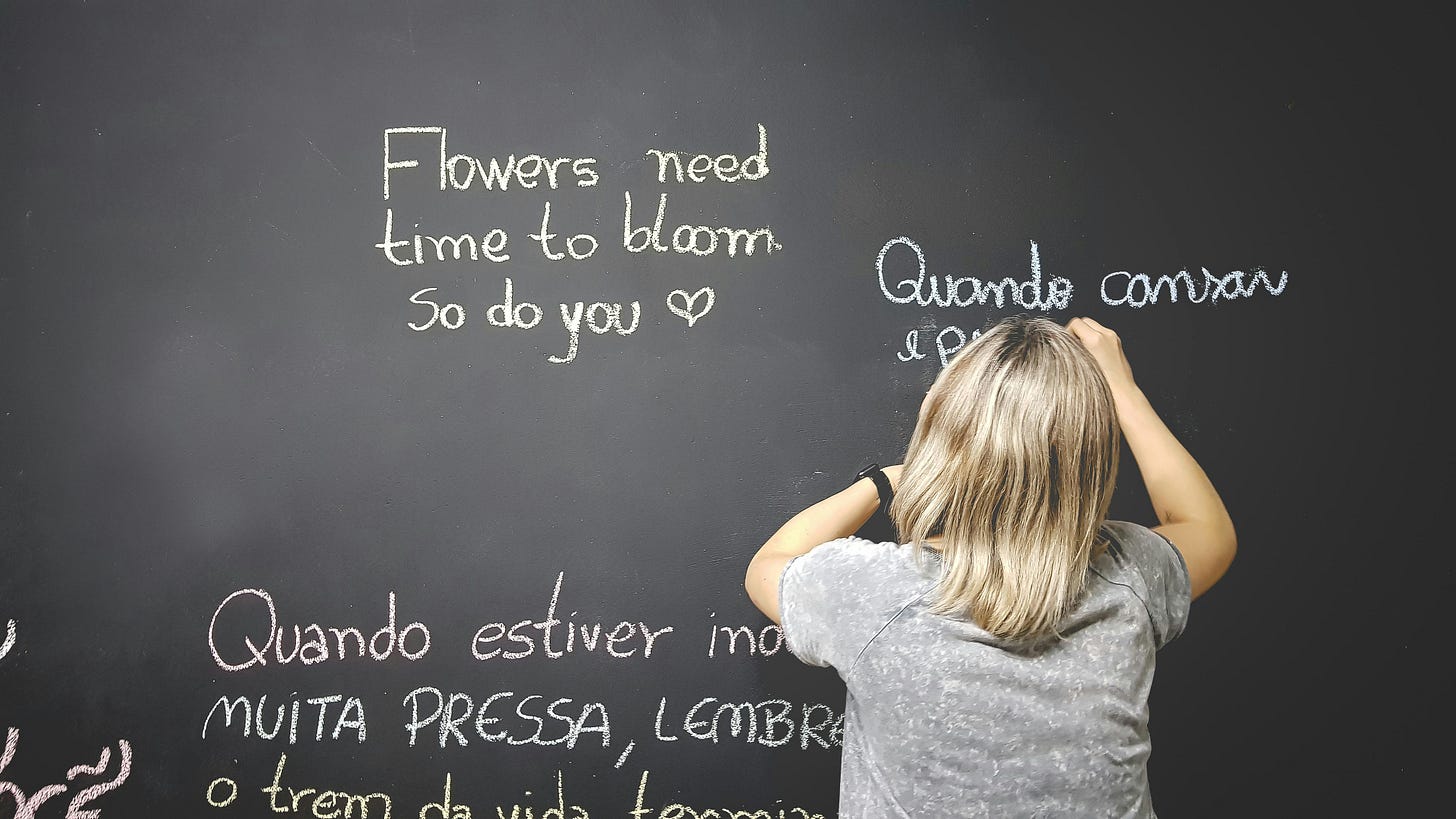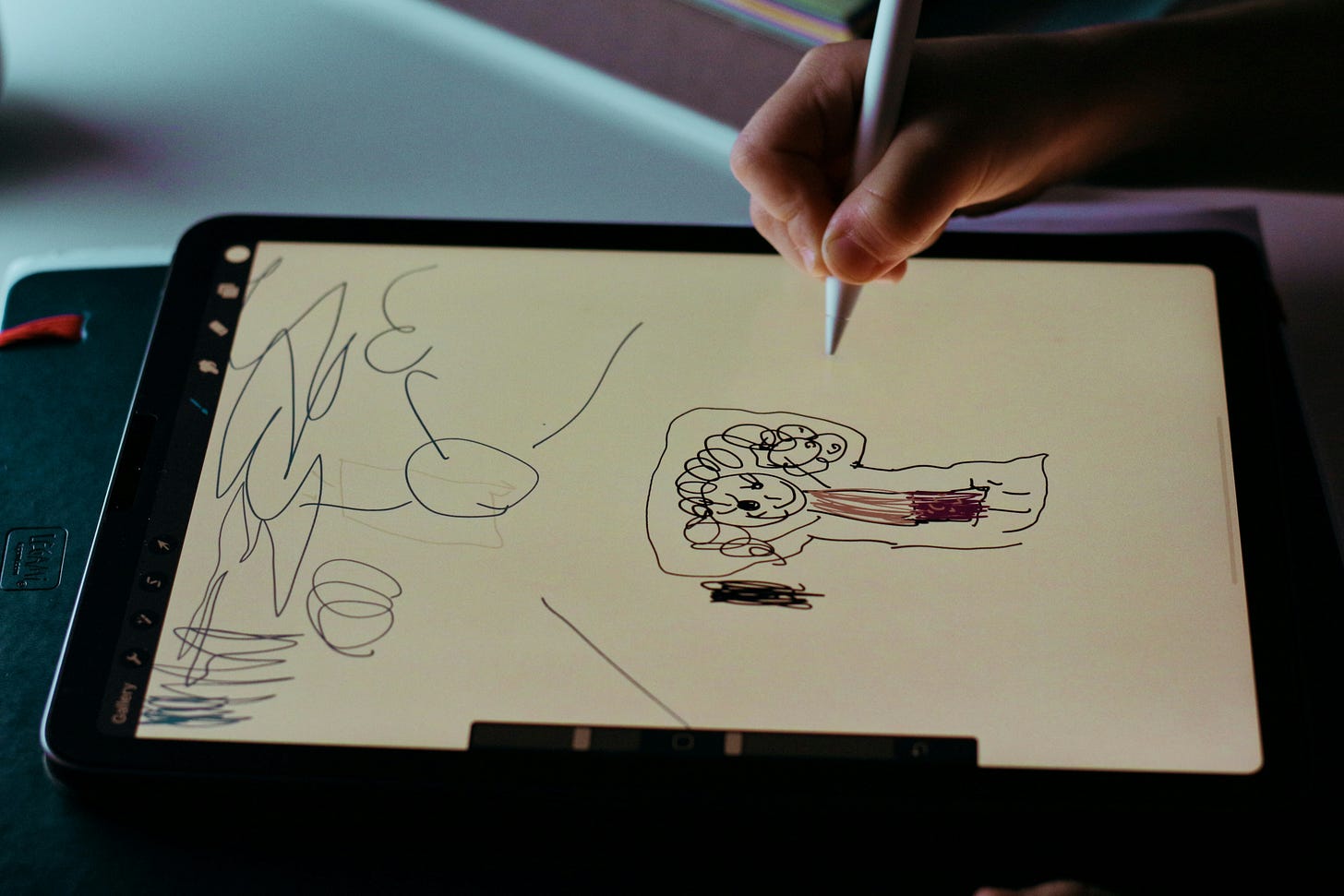
Language learning is a hot topic in my family at the moment. I’m in perpetual pursuit of improving my German and Italian, given that I live in a part of Italy where both languages are spoken widely in day-to-day life. Back in the UK, at 72 and having finally retired, my dad has immediately enrolled in a German course at university, going from senior doctor to student in a matter of weeks.
Learning a new language as an adult is humbling. Any sense of eloquence you might have in your mother tongue feels like a far-away dream. The focus turns to communicating your intended message in whatever way you can, using your limited vocabulary and basic grasp of the grammar. Perfectionism will only hold you back. You have to accept that you will make numerous, at times embarrassing, mistakes. You have to be prepared and come to terms with the fact you’re a beginner again.
“I think perfectionism is based on the obsessive belief that if you run carefully enough, hitting each stepping-stone just right, you won’t have to die. The truth is that you will die anyway and that a lot of people who aren’t even looking at their feet are going to do a whole lot better than you, and have a lot more fun while they’re doing it.” Anne Lamott, Bird by Bird
Beginner’s mind; growth mindset. These terms are frequently thrown around in the world of work. Everyone agrees that yes, these mindsets are very important and everyone thinks – hopes – that they demonstrate them. But do we really, truly understand what they mean? And how often do we challenge ourselves to put them into practice?
In this newsletter:
Beginner’s mind
Growth mindset
Cultivating a better learning mindset
Tips for being a beginner

Beginner’s mind
Although I’d heard the term both at work and through other creative endeavours, I didn’t realise until I began researching this newsletter that the concept of ‘beginner’s mind’ comes from Zen Buddhism. Beginner’s mind is all about approaching life, learning, work (however you want to apply it) with the openness and curiosity that comes with being a true beginner. It’s a counter to the approach the expert takes, prohibited by their knowledge and a fixed idea of how things should be.
In Zen Mind, Beginner's Mind: Informal Talks on Zen Meditation and Practice, Shunryu Suzuki writes: “In the beginner's mind there are many possibilities, but in the expert's there are few”. Of course, expertise is important, but if you are an expert in something, it’s helpful to recognise where this might be holding you back, preventing you from noticing new ways of doing things or learning something new.
Language learning is a great place to think about the beginner’s mind. I’ve noticed that, learning a language as an adult, it can be hard to let go of the expertise you have in your mother tongue. Yes, you might be learning an entirely new language but you’re something of an expert in your mother tongue and it can be hard not to compare everything in your new language to what you know in your native language. This can mean trying to translate every sentence, analysing the grammar or comparing aspects of culture in relation to your own language. We say it like this. We don’t do it like that in England. It’s easy to become frustrated with your inability to express yourself with the same eloquence you’re used to in your mother tongue. You may even find yourself giving up. It’s too hard, you say.
In the language learning community (yes, there’s a whole world of brilliant resources out there and people sharing tips and inspiration), one often talked about topic is the coveted status of ‘fluency’. Starting out, everyone wants to know how they can become fluent fast. It’s as though fluent is a fixed state, a level you can reach, a certificate you can get that means you’re sorted for life. People seem to have the idea that once you’re fluent, you don’t have to learn anymore, you’ve completed the task. But polyglots and veteran language learners will tell you that fluency isn’t like that. It’s a scale, a process that needs constant nourishing. The truth is, the learning is never really over.
It’s perhaps a workplace cliché, the story of the older expert who thinks they know best and refuses to listen to the ideas of the young graduate. Yet there’s truth to it. I’ve certainly been in meetings where this has been a reality. I’ve also seen myself become more closed the more experience I’ve gained. It’s easier to be protective of your knowledge and it can make you feel confident when you have a clear opinion. Yet this can limit us from seeing really good ideas, or new insights. Being able to apply a beginner’s mind can be a huge asset for any kind of organisation, leading to greater creativity and innovation – and improving competitive edge.

Growth mindset
Perhaps the perfect partner for the beginner’s mind is the growth mindset. Psychologist Carol Dweck coined the concept of growth mindset in her book Mindset: The New Psychology of Success. According to Dweck, a person with a growth mindset sees intelligence as skills and attributes that can be worked on and improved. A person with a fixed mindset sees intelligence as static – a talent that you’re born with. Dweck’s research has shown that if you have a fixed mindset, you’re more likely to seek out opportunities that demonstrate your strengths and avoid anything that might expose your weaknesses – thus making it difficult for you to learn and grow.
In a TED talk on growth mindset, Dweck talks about the concept of ‘not yet’. Not yet allows us room to grow. Whether we’re currently skilled or unskilled in a particular field, knowledgeable or not, saying not yet gives us permission to grow. Instead of telling ourselves: I’m not good at speaking Italian, the concept of not yet allows us to say: sure, I’m not good at speaking Italian yet, but if I put the work in I can improve.
I came across the concept of growth mindset through work, but I wish I’d more of it in action. According to a recent survey, 96% of executives say they embody a growth mindset, yet only 45% of employees agree that their leadership demonstrates this mindset. When I worked in an office, I often heard comments from managers such as “he/she isn’t good at that”. In a busy, high-pressured workplace, we can be quick to dismiss others’ skills and capabilities without giving them a chance. In such an environment, it’s also easy to limit your own potential. I’m not good at this – yet, becomes: I’m not good at this – full stop.
“Give yourself permission to be a beginner. By being willing to be a bad artist, you have a chance to be an artist, and perhaps, over time, a very good one.” Julia Cameron, The Artist’s Way
Cultivating a better learning mindset
I’m the first to put up my hand and say I haven’t been very good at embodying either a beginner’s mind or a growth mindset. The British school system is heavily focused on exam results. The message is: to go far in life, what you need is good grades.
I’ve come to realise that good grades can be extremely limiting – especially when it comes to learning. My experience is that there’s nothing that makes you less inclined to experiment, try out new things or take a few risks than getting good grades. Focused on keeping your perfect average, you apply strategies to make sure you maintain those good results: choosing subjects you’re already good at, playing it safe, avoiding anything new or at first difficult.
Learning languages as an adult has been challenging for someone like me who doesn’t like being bad at anything. But Dweck’s concept of ‘not yet’ is liberating in this regard. It frees us up to be really bad, fail and get better. Of course, we’ll still encounter other people making judgements about our abilities – people who clearly aren’t clued in to the concepts of growth or beginner’s mind. My advice? Swallow your pride and ignore them. You know that your willingness to be a beginner will get you further in the end.
At work, being willing to say you don’t know, staying curious and willing to find out a solution (instead of jumping to the first thing that comes to your mind) can make you much better at your job, and a much greater asset to your employer. I sometimes wonder what the world would be like if we had more leaders – at work and in politics – who were willing to say they don’t know all the answers. Perhaps to enable that we as society would need to label less and give people the space and grace to grow.
We won’t solve these macro issues through Curiosity Seeds (!), but we can each try to get a little better at putting these mindsets into practice ourselves.
Tips for being a beginner
Note down what it is you want to achieve in the long term – be specific.
Ignore other people’s opinions.
See it as a process.
Do some self-reflection: are you applying a beginner’s mind to your work, or are you hindered by the view of the expert?
Practice being a beginner in a safe space. Do something outside of work that can help you get used to being a beginner. Learn a new language. Start a painting course. What’s that thing you’ve always wanted to learn but felt it was too late?
What have you been learning lately? Share your experience in the comments!
Have we sparked your curiosity? ✨ Read more:
Watch Carol Dweck’s TED Talk on the Power of Not Yet.
Why Adults Lose the Beginner’s Mind | The New York Times | Ezra Klein (Podcast)
Your powerful, changeable mindset | Stanford University (Article)





DUDE. I love this. I started taking a beginner ballet class this year. I AM SO BAD! But that’s okay. At this early stage my progress is more exciting—instead of polishing a skill I’ve had for years, I get to do things I couldn’t do a few weeks ago. 🩰